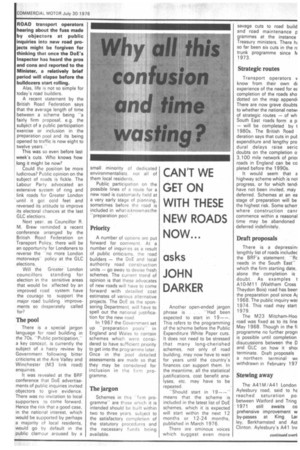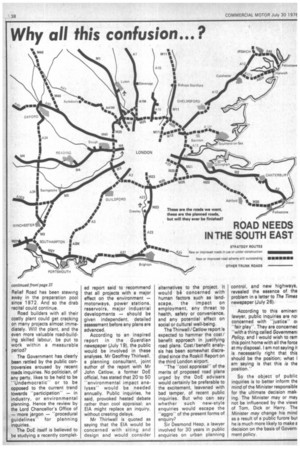CAN'T WE GET ON WITH THESE NEW ROADS NOW...
Page 39

Page 40

If you've noticed an error in this article please click here to report it so we can fix it.
asks JOHN DARKER
ROAD transport operators hearing about the fuss made by objectors at public inquiries into new road projects might be forgiven for thinking that once the DoE's Inspector has heard the pros and cons and reported to the Minister, a relatively brief period will elapse before the bulldozers start rolling.
Alas, life is not so simple for today's road builders.
A recent statement by the British Road Federation says that the average length of time between a scheme being "a fairly firm proposal, e.g. the subject of a public participation exercise or inclusion in the preparation pool and its being opened to traffic is now eight to twelve years " This was so even before last week's cuts. Who knows how long it might be now?
Could the position be more ludicrous? Public opinion on the ' subject of roads is fickle. The Labour Party advocated an extensive system of ring and link roads for Greater London ' until it got cold feet and reversed its attitude to improve its electoral chances at the last GLC elections.
Next year. as Councillor R. M. Brew reminded a recent conference arranged by the British Road Federation on Transport Policy, there will be an opportunity for Londoners to reverse the no more London motorways' policy at the GLC elections._ Will the Greater London councillors standing for election in the sensitive areas that would be affected by an improved road system have the courage to support the major road building improvements so desperately called for?
The pool
There is a special jargon language for road building in the 70s. "'Public participation," a key concept, is currently the subject of a hasty review by Government following bitter criticisms at the Aire Valley and Winchester (M3 link road) enquiries.
It was revealed at the BRF conference that DoE advertisements of public inquiries invited objectors to give evidence. There was no invitation to local supporters to come forward. Hence the risk that a good case, in the national interest, which would be supported by perhaps a majority of local residents, would go by default in the public clamour aroused by a small minority of dedicated environmentalists, not all of them local residents.
Public participation on the possible lines of a route for a new road is customarily held at a very early stage of planning, sometimes before the road is included in what is known as the "preparation pool:"
Priority
A number of options arc put forward for comment. At a number of inquiries as a result of public criticisms, the road builders — the DoE and local authority road construction units -go away to devise fresh schemes. The current trend of opinion is that these advocates of new roads will have to come forward with detailed cost estimates of various alternative projects. The DoE as the sponsoring Department, will have to spell out the national justification for the new road.
In 1 967 the Government set up -preparation pools" in England and Wales to contain schemes which were considered to have sufficient priority to get into the programme later. Once in the pool detailed assessments are made so that they may be considered for inclusion in the firm programme.
The jargon
Schemes in this "firm programme" are those which it is intended should be built within two to three years subject to the satisfactory completion of the statutory procedures and the necessary funds being available. Another open-ended jargon phrase is . . "Had been expected to start in 19--. This refers to the programming of the scheme before the Public Expenditure White Paper cuts. It does not need to be stressed that many long-cherished schemes, not only of road building, may now have to wait for years until the country's finances can support them. In the meantime, all the statistical justifications. cost benefit analyses, etc. may have to be repeated.
"'Should start in 19----" means that the scheme is included in the latest list of DoE schemes, which it is expected will start within the next 12 months or 12-24 months, published in March 1976.
There are ominous voices which suggest even more savage cuts to road build and road maintenance p grammes at the instance Treasury ministers. There ht so far been six cuts in the rc trunk programme since N 1973.
Strategic routes
Transport operators v know from their own th experience of the need for ez completion of the roads sho dotted on the map append! There are now grave doubts to whether the national netwr of strategic routes — of wh South East roads form a p -will be completed by t 1980s. The British Road deration says that cuts in put expenditure and lengthy pro dural delays raise seric doubts on the completion o 3,100 mile network of prior roads in England can be co pleted before the 1990s.
It would seem that a highway scheme which is not progress, or for which tend' have not been invited, may deferred. Schemes at an ea stage of preparation will be the highest risk. Some schenwhere construction canr commence within a reasonal time may be abandoned deferred indefinitely.
Draft proposals
There is a depressini lengthly list of roads includec the BRE's statement: -13c needs in the South East" which the firm starting date, alone the completion is doubt. As examples t Al 0-M11 (Waltham Cross Theydon Bois) road has been the preparation pool since A; 1968. The public inquiry waE 1974. This road may start 1979.
The M23 Mitcham-Hoo road was fixed as to its line May 1968. Though in the fi programme no further progn is possible until completion disucussions between the D and GLC on how it shot terminate. Draft proposals a northern terminal WE withdrawn in February 197
Stewing away
The A41M /A41 London Aylesbury road, said to hE reached saturation po between Watford and Tring 1971 still awaits co prehensive improvement w by-passes at King Lar Icy, Berkhamsted and Ast Clinton. Aylesbury's A41 lnr Relief Road has been stewing away in the preparation pool since 1972. And so the drab recital could continue.
Road builders with all their costly plant could get cracking on many projects almost immediately. Will the plant, and the even more valuable road-building skilled labour, be put to work within a measurable period?
The Government has clearly been rattled by the public controversies aroused by recent roads inquiries. No politician, of any party, likes to be held to be "Undemocratic" or to be opposed to the current trend towards "participation" — in industry, or environmental planning. Hence the review by the Lord Chancellor's Office of — more jargon — "procedural guidelines" for planning inquiries.
The DoE itself is believed to be studying a recently complet
ed report said to recommend that all projects with a major effect on the environment — motorways, power stations, reservoirs, major industrial developments — should be given independent, detailed assessment before any plans are advanced.
According to an inspired report in the Guardian newspaper (July 19), the public would be involved in these analyses. Mr Geoffrey Thirlwall, a planning consultant, joint author of the report with Mr John Catlow, a former DoE official, has stated that 20 to 50 "environmental impact analyses" would be needed annually. Public inquiries, he said, provoked heated debate rather than cool appraisal; an EIA might replace an inquiry, without creating delays.
Mr Thirlwall is quoted as saying that the EIA would be concerned with siting and design and would consider alternatives to the project. It would b6 concerned with human factors such as landscape, the impact on employment, any threat to health, safety or convenience, and any potential effect on social or cultural well-being.
The Thirwall/Catlow report is expected to hammer the cost/ benefit approach in justifying road plans. Cost/benefit analysis has been somewhat discredited since the Roskill Report on the third London airport.
"The "cool appraisalof the merits of proposed road plans urged by the DoE advisers would certainly be preferable to the excitement, leavened with bad temper, of recent public inquiries. But who can say whether such new-style enquiries would escape the "aggro" of the present forms of enquiry?
Sir Desmond Heap, a lawyer involved for 30 years in public enquiries on urban planning
control, and new highways, revealed the essence of the problem in a letter to The Times newspaper (July 26).
According to this eminery lawyer, public inquiries are not concerned with "justiceoi "fair play". They are concernec "with a thing called Governmeni Policy, and I would wish to ram this point home with all the force at my disposal. I am not saying ii is necessarily right that this should be the position; what I am saying is that this is the position."
So the object of public inquiries is to better inform the mind of the Minister responsible for the ultimate decision making. The Minister may or may not be influenced by the views of Tom, Dick or Harry. The Minister may change his mind as a result of a public furore bill he is much more likely to make a decision on the basis of Government policy.




















































































